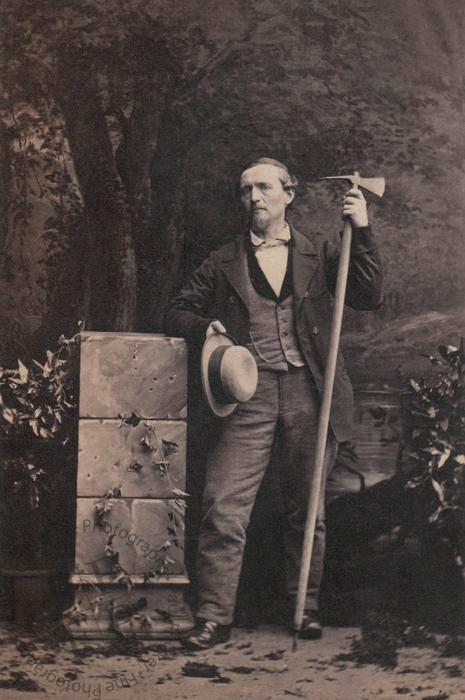Johann Joseph Bennen
(1824-1864)
13 June 1862
Volume 7, page 117, sitting number 8714.
[The sitter is identified as ‘J.J. Bennen’ in the Silvy books. A pencilled inscription verso in a period hand reads ‘Bennen / Weisshorn / 1864.’ The Weisshorn is a major peak in the Swiss Alps.]
Born at Steinhaus in the Swiss canton of Valais on 2 November 1824, Johann Joseph Bennen was a celebrated mountain guide in the Swiss Alps.
On 18 June 1859 Bennen made the first ascent of the Aletschhorn accompanying the English Alpinist Francis Fox Tuckett with fellow guides Peter Bohren and Victor Tairraz.
On 18 July 1861 he was one of the three guides who led Francis Fox Tuckett and Leslie Stephen (father of Virginia Woolf and Vanessa Bell) on the first ascent via today’s ‘normal route’ to the summit of Mont Blanc.
On 19 August 1861 he became one of the first climbers to conquer the Weisshorn, when he and another guide, Ulrich Wenger, helped the Irish physicist and mountaineer John Tyndall reach the summit.
When in 1863 John Tyndall made his second attempt to climb the Matterhorn, he again chose J.J. Bennen as one of his two guides. (The ascent also included two porters.) The men succeeded in reaching a small prominence, since named Pic Tyndall, just below the summit but separated from it by a deep cleft. At the time, this was the highest point on the Matterhorn that anyone had ever reached.
Bennen was killed by an avalanche on 28 February 1864 while attempting to lead Philipp Gosset and Louis Boissonet on an ascent of the Haut de Cry in the Bernese Alps. Boissonet was also killed but Gosset and three other guides survived. Gosset subsequently wrote a vivid account of the accident:
‘Bennen advanced; he had made but a few steps when we heard a deep, cutting sound. The snow-field split in two about fourteen or fifteen feet above us. The cleft was at first quite narrow, not more than an inch broad. An awful silence ensued; it lasted but a few seconds, and then it was broken by Bennen's voice, 'We are all lost.' His words were slow and solemn, and those who knew him felt what they really meant when spoken by such a man as Bennen. They were his last words. I drove my alpenstock into the snow, and brought the weight of my body to bear on it. I then waited. It was an awful moment of suspense. I turned my head towards Bennen to see whether he had done the same thing. To my astonishment I saw him turn round, face the valley, and stretch out both arms. The snow on which we stood began to move slowly, and I felt the utter uselessness of any alpenstock. I soon sank up to my shoulders, and began descending backwards. From this moment I saw nothing of what had happened to the rest of the party’ (Quoted in Edward Whymper’s Scrambles amongst the Alps, 1871).
Gosset’s account of the accident also appeared in John Tyndall’s Hours of Exercise in the Alps, published the same year.
Bennen’s gravestone at Ernen in the Valais was erected by the climbers John Tyndall, F. Vaughan Hawkins and Francis Fox Tuckett. According to a modern plaque [in German] beside the grave, Bennen was ‘in the golden age of mountaineer (1855-1865) one of the most famous mountain guides in the Swiss Alps. In John Balls’s travel guide he is referred to as “the Garibaldi of Guides” because of his mountaineering style. This worthy gravestone was donated by Francis Tuckett and John Tyndall, but with inaccurate life dates and the wrong place of birth.’
[Bennen visited Silvy’s studio with the British mountaineer Francis Fox Tuckett, who is the preceding entry in the daybooks.]

